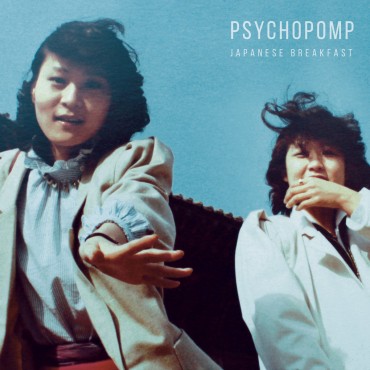
After a minute of shuffling, car doors slamming, and voices bouncing in the distance, Michelle Zauner hops back into our phone conversation without a beat.
“I had to get someone to drive because we’re filming this video and I’m just stressed sort of,” she explains, throwing a quick apology to everyone in the car. “You know, just classic multi-tasking.” Considering the fact that moments before, Zauner was elaborating on her grief process following a family member’s death and her dissatisfaction with organized religion’s answers for the afterlife, her honesty isn’t all that surprising at this point.
While the modern music fan’s demand for constant emotional openness from their favorite artists has unhealthy expectations, it’s nearly impossible to picture Zauner creating an album as elegantly visceral as Psychopomp, her first proper full-length as Japanese Breakfast, without flinging the past two years of her life out in the open.
Although Japanese Breakfast was initially prefixed as a side-project of Philadelphia emo outfit Little Big League, which Zauner was the singer/guitarist of for nearly half a decade, Psychopomp is as much of an attempt to clarify history as it is to start a new one.
“The record spanned six years of writing. [“Everyone Wants To Love You”] was one of the first songs written, but obviously not with this record in mind,” Zauner says. “It’s kind of like a compilation record in a lot of ways, but it was put together after a really traumatic experience in my life.”
The catalyst in question was the death of Zauner’s mom within six months of her cancer diagnosis.

“My mom had lost her younger sister to cancer; she had done 24 rounds and it didn’t work, so my mom had decided pretty early on that she wasn’t going to have any treatments. We just had to accept that that was what she wanted to do.”
Zauner moved home to Oregon to become one of her mom’s primary caretakers, effectively putting her life in Philadelphia on hold. As a result, Little Big League, in Zauner’s words, “imploded”, leaving her bandmates to explore wildly disparate side projects. Drummer Ian Dykstra started playing for fellow Philly act Sheer Mag, guitarist Kevin O’Halloran formed the jangle poppy Mercury Girls, and bassist Deven Craige joined americana-tinged pop rock act Strand of Oaks.
“If you heard all these projects, you’d have no idea they were all playing in a band together at one point,” Zauner adds with a laugh.
Meanwhile, Zauner’s decision to flesh out Japanese Breakfast as more than a showcase for her songwriting experiments (including an EP released as part of a blog conversation with Eskimeaux and Frankie Cosmos) came out of necessity. “Basically, I was stuck in Oregon for about a year, both helping my mom through her illness and being with my dad after she passed away. I had nothing to do; I couldn’t work a job because my primary reason for being there was to help out and be present. When I would have moments to myself, I would put this record together.”
As a result, Psychopomp is Japanese Breakfast’s most focused effort, but weaves wildly between the snarling guitar work Zauner employed with Little Big League (“Rugged Country”), synthpoppy odes to romance that gleefully rhyme ‘breakfast in bed’ with ‘give me lots of head’ (“Everyone Wants to Love You”), and weight of the world-burdened shoegaze dirges (“Jane Cum”). Regardless of its spread out influences, Psychopomp feels split between two major concepts: reckoning with death unconsciously and persevering with life in the conscious world.
“There was a note about a ‘psychopomp’ that, in Jungian psychology, they’re supposed to represent this midway figure between the conscious and unconscious realms. When I saw the word, I really liked the way it looked. It kind of looks like “psychotic pop”, which, if I had to describe a genre for this record, it’d be that.”
Psychopomps also exist in Greek mythology as ushers for the dead, offering guidance without judgement as souls head into the afterlife. “As one of my mom’s primary caretakers during her illness, that was sort of the role I had taken with her,” Zauner added.
 With the arresting cover image of her mother reaching out from a decades-old photograph, Zauner is forthright about Psychopomp being an intensely personal document. “I was in this position where this album was kind of a ‘throwaway record’ for me, like something I wanted to do for myself,” she admits. “I realized it was really resonating with people though, so I decided I wanted to turn this into my main project.”
With the arresting cover image of her mother reaching out from a decades-old photograph, Zauner is forthright about Psychopomp being an intensely personal document. “I was in this position where this album was kind of a ‘throwaway record’ for me, like something I wanted to do for myself,” she admits. “I realized it was really resonating with people though, so I decided I wanted to turn this into my main project.”
After eventually completing Psychopomp with her college friend and fellow DIY electronic tinkerer Ned Eisenberg as co-producer, naturally daunting tasks like putting together a band around a completed record and touring again seem minuscule to Zauner. If anything, the most (and seemingly only) fearsome task at hand for her is living with her creation.
“I always skip the title track when I listen to the record,” Zauner admits. “I mean, that’s my mom’s voice.” The sparse instrumental track is bookended with a phone recording of her mother telling her not to cry, recorded right after she stopped all treatments. “I wanted to put her voice on the record because I wanted to encapsulate her memory. I feel like that’s a very natural instinct, but I absolutely cannot listen to that song. How could I?”
An album’s soul-baring force is telling when its writer can’t bear to revisit it, but Japanese Breakfast rises above the standard musician’s offering on mortality by avoiding convenient typecasts of a “sad record.” Much like the actual grieving process, Psychopomp rides through the disjointed waves of grieving, interjecting masterfully with wounded anger, self-reflection, heartbreak, and wide-eyed joy often within its brief twenty-five minutes.
“I had a lot people come to me saying “she’s in a better place now” or “she’s in heaven”, which was really frustrating for me because I couldn’t really take solace in that. I just didn’t really believe in that kind of thing,” Zauner concludes.
And ultimately, whether she’ll be able to play the title track one day or not, Psychopomp’s greatest triumph is clear as the self-made solace of its creator.
Psychopomp is streaming now via Hype Machine and will be available April 1st via Yellow K Records.
